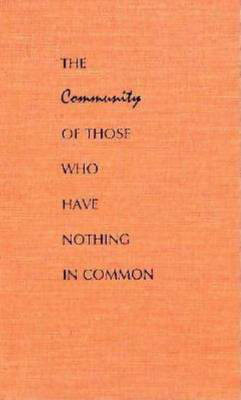Community of Those Who Have Nothing in Common(English, Hardcover, Lingis Alphonso)
Quick Overview
Product Price Comparison
"Is there not a growing conviction today that the dying of people with whom we have no racial kinship, no language, no religion, no economic interests in common concerns us?" Alphonso Lingis takes as his point of departure the mortality that unites all people, even those who seemingly have nothing else in common. Lingis' provocative essays illuminate the community we construct with those who have no truth to offer us, with the dying as they leave us, even with creatures that have no species kinship with us. "The Intruder" reveals that what concerns us in the other is precisely his or her otherness, which both appeals to us and contests us face to face. "Faces, Idols, Fetishes" explains how real values are not what people have in common but what individualizes them and makes them other. In "The Murmur of the World", language is seen not simply as a code that humans have established by convention but as a phenomenon arising from the murmur of nature, the way we communicate not only with human decoders but with nature itself."The Elemental That Faces" considers situations in which the content of speech is of little importance, the times when what is essential is our presence and the act of speaking. "Carrion Body, Carrion Utterance" denounces a specific type of torture: when victims are forced to denounce all their beliefs as a lie, to state that they are incapable of truth. "Community in Death" enunciates the community of all the living with those who are dying. Articulating the author's journeys and personal experiences in the idiom of contemporary continental thought, "The Community of Those Who Have Nothing in Common" launches a devastating critique, pointing up the myopia of Western rationalism. Here, Lingis raises issues of undeniable urgency.


